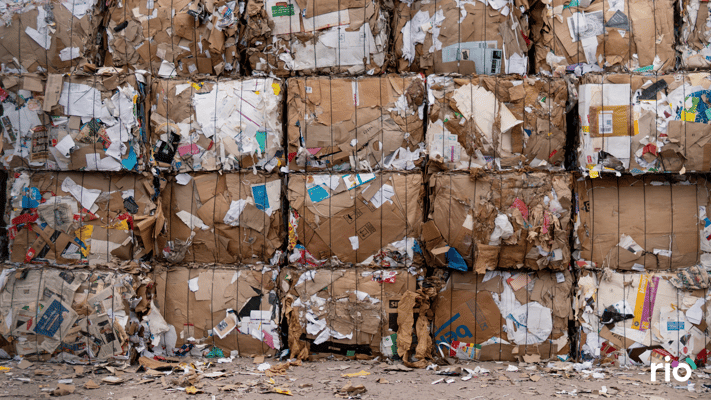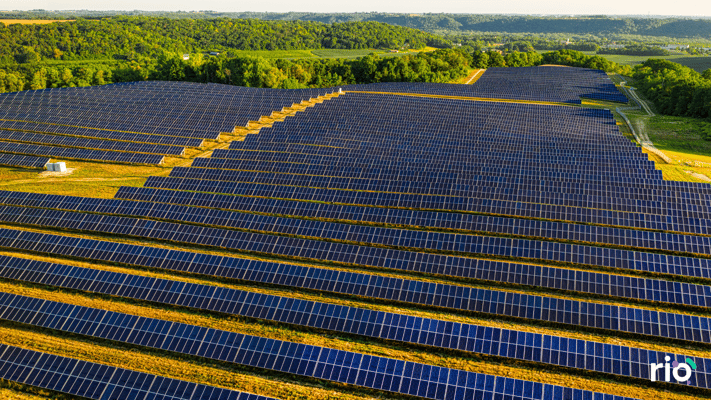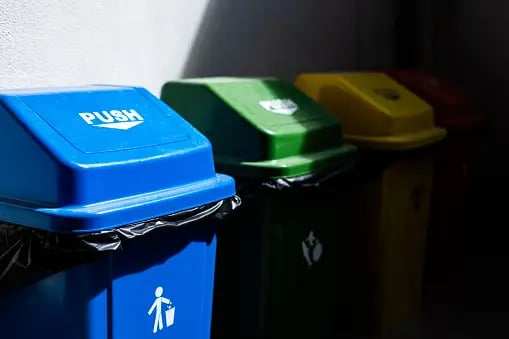In a time when organisations are meticulously searching for greater efficiencies in all facets of their work, waste management seems to be overlooked in many cases. Our waste is often dumped on contractors, with limited attention to where it goes or whether we are receiving value for the service.
The first step in delivering good waste management is to take responsibility for the process.
This article presents three steps to allow you to reduce waste costs, enhance resource efficiency and improve environmental sustainability.
The steps towards a good waste management plan
1. Implement a strategy that focuses on the waste hierarchy
Before considering the role of the contractor, it is key to develop a clear waste management plan based around the waste hierarchy. The waste hierarchy ranks waste management options according to their effectiveness for protecting the environment.
The unique materials and processes used in different sectors and organisations mean that the final strategy will differ from case to case. However, as a rule of thumb, it ensures that your organisation is producing the lowest volume of waste possible and each material is dealt with in the most sustainable and cost-effective manner.
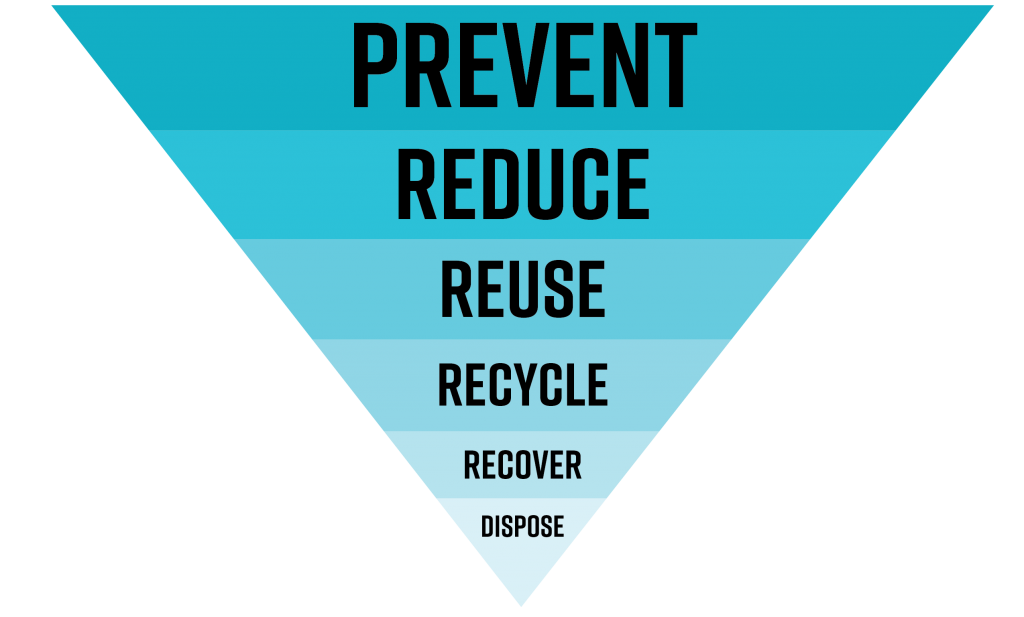
i. Prevent
Prior to addressing the disposal of waste, it is vital to reflect upon whether your organisation is minimising its production. The option to prevent waste is always the optimal choice when following the waste hierarchy. Including your workforce in developing your strategy is key in identifying wastage and planning for its elimination. Procurement and design departments can be particularly influential in this sense.
ii. Reuse
Once you have reduced your waste production, you can turn your attention to becoming more circular with resource use. In the right circumstance, exploring material reuse can be a fantastic way of finding extra cost savings and can be an easy transition to make when the opportunity can be controlled internally.
iii. Recycle
It’s at this point where you start looking towards recycling options. There is a tendency for companies to aim for a ‘high recycling rate’, which typically involves collecting the largest quantity of mixed recyclable waste and then passing the responsibility to the contractor. The issue with this approach is that It makes it very difficult for recycling facilities to separate and recover materials, leading to them being exported overseas as waste, burned or even landfilled.
In 2019, 150,000 tonnes of plastic waste were exported every month to countries with high plastic pollution such as Indonesia, Vietnam and Malaysia. In this way, it is far more effective putting your efforts towards prevention and reuse opportunities, while ensuring that any recyclable waste is accurately segregated.
iv. Recovery
Material recovery can involve a range of processes, from waste incineration to anaerobic digestion of organic substances and the conversion of materials for use in construction. While these are superior options to landfilling, the jury is out as to the environmental benefit of these methods, primarily because there is significant pollution created in each recovery process.
In 2017, UKWIN measured that incinerators produced twice the level of carbon emissions, per kWh of electricity generated, compared to gas turbines. As such, whether waste recovery is an option for your company is down to personal preference and the reusability/recyclability of your waste material.
v. Disposal
If there are no other feasible waste management solutions, your last resort in the waste hierarchy is disposal.
Aside from having the highest negative environmental impact, this is now the most expensive disposal option, with the UK’s landfill tax having risen to £94.15 per tonne of waste since 1st April 2020. This makes it a completely unsustainable option for a company seeking efficiency in their waste management.
2. Assess your contractor in line with your new waste strategy
Traditionally, a contractor’s role is focused on the lower half of the waste hierarchy, i.e. recycling, recovery and disposal. Once you have planned your strategy and identified your goals and targets for how you would like to treat your waste moving forward, you are ready to assess your contractor.
Whether you end up changing waste contractors or not, using a sustainable procurement approach can help you incentivise contractors to align with your waste management goals and make sure you are not getting ripped off.
From the outset, it is key to note that some contractors are more committed to working sustainably than others. In this way, you should take the time to interview a number of contractors and test them on their environmental and social credentials, as well as their cost transparency and service level. Building a scoring matrix that accounts for these factors is key to delivering an informed decision-making process for selecting your contractor.
Once you have made your selection, it is key to take the lead on developing a clear monitoring system based on intuitive waste management reporting. Here you are looking for a pro-active relationship, which provides you with the necessary information and data for driving an effective waste abatement regime.
3. Ensuring best value
Having delivered a progressive waste management process with your contractor you can look towards creating value for your organisation. This stage is all about driving cultural and practical focus on the prevention and reuse phases of the waste hierarchy.
There are three key areas that should be addressed to achieve this: engaging your workforce with the waste management process, understanding your compliance position and monitoring the performance of your waste management process.
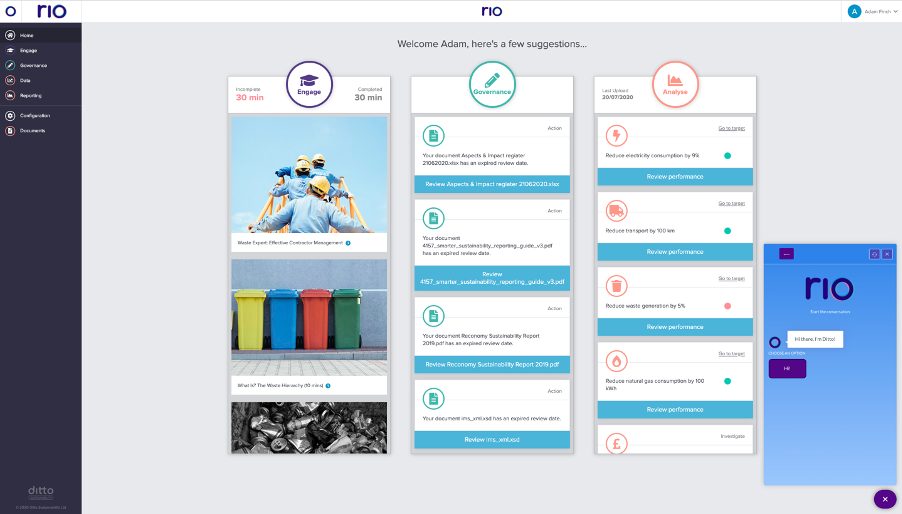
Rio works with waste producers as well as waste contractors, helping organisations to manage their resource efficiency. Our sustainability platform (shown above) provides learning, compliance and data analytics capabilities in an interactive interface designed to support your waste management process.
Engage
Educating your team around your waste strategy and wider concepts of sustainability is key to having a knowledgeable workforce, which can autonomously promote greater resource efficiency within your organisation. It is also vital that team members, who are working directly with your waste contractor, fully understand how to process and utilise the information in waste management reports.
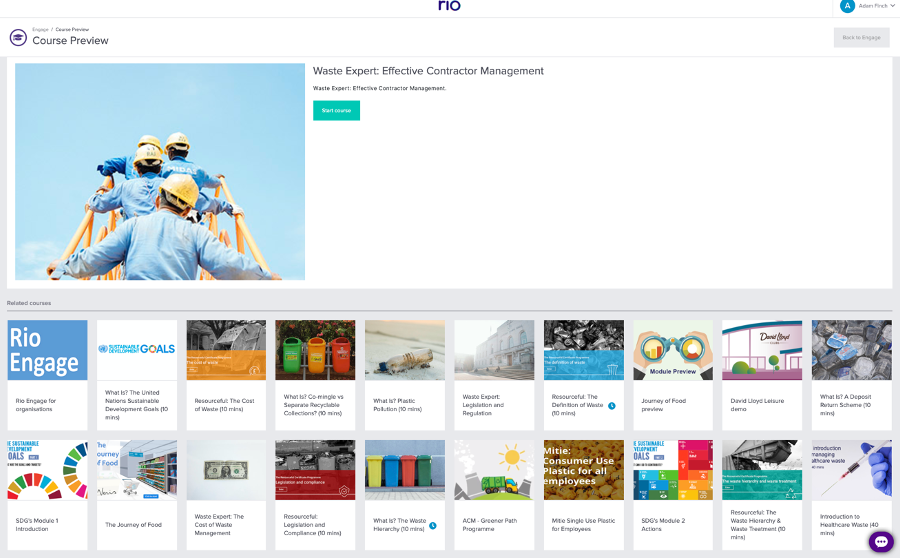 Rio provides a variety of sustainability-based learning modules which can be tailored according to the needs of your organisation.
Rio provides a variety of sustainability-based learning modules which can be tailored according to the needs of your organisation.
Governance & Compliance
As your systems change, it becomes even more important to pay attention to your waste management compliance position.
Your organisation has a legal duty of care in relation to waste management and must be proactive in ensuring that potential compliance issues, flagged up by waste management reports, are acted upon.
You should also be aware of any compliance documents you require and that your contractor has made these available to you. Waste management law is a very complex area to navigate, especially if you operate across multiple sites in the UK.
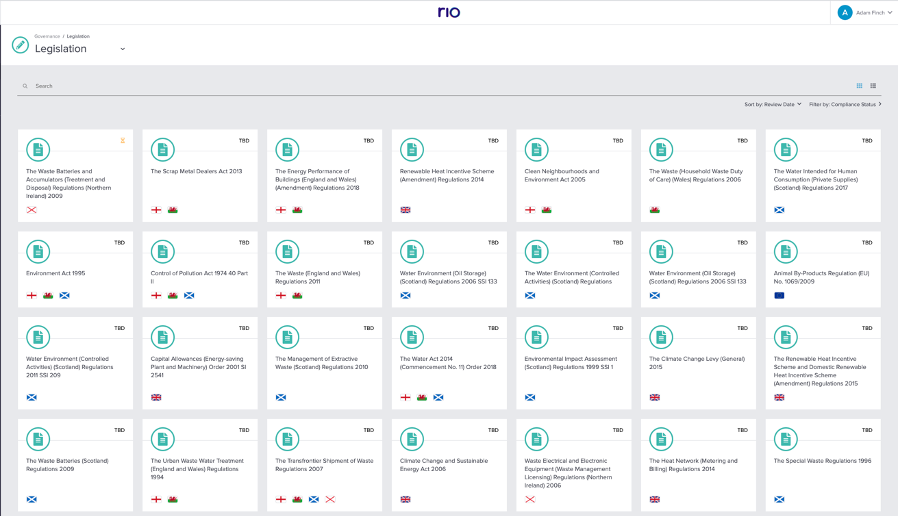 Rio provides a library of circular economy-related legislation to help you monitor your compliance position.
Rio provides a library of circular economy-related legislation to help you monitor your compliance position.
Analyse
Once you are receiving your waste management reports, it is vital that you are capturing good quality data that can help improve your strategy and enhance your resource efficiency. To achieve this, you must analyse the impact of the changes you have made according to the targets you set at the beginning of the process.
By understanding what areas of the waste management process you have improved and why, your organisation can continually build upon the improvements made in coordination with the contractor(s).
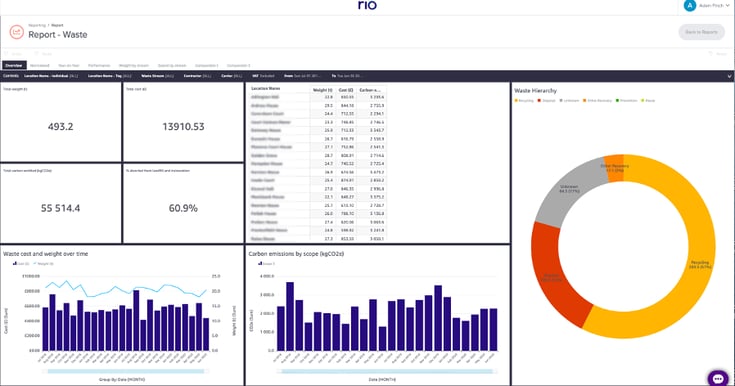
Rio provides a combination of data analytics and artificial intelligence to analyse your waste data, diagnose inefficiencies and provide cost-saving solutions.
Conclusion
Once you have made the initial decision to take responsibility for your waste, the results speak for themselves.
Implementing an environment where your business is proactively making effective decisions to manage and reduce waste provides your organisation with key efficiency gains, cost-savings and keeps you ahead of the curve in delivering an environmentally sustainable business model. Crucially, developing a strategy and employing the right contractor is just the beginning of the journey towards a good waste management system.
The real rewards are achieved when the system is being implemented by a knowledgeable workforce, is compliant with legislation and the impact of the changes made are being measured and improved upon.
Rio waste management case studies

Axil is a waste management company that works with their clients to help develop better resource efficiency.
Their Total Waste Management system helps customers increase recycling and supports the top end of the waste hierarchy with waste prevention. Working with Axil, our platform Rio provides a centralised reporting interface where clients can analyse and manage their waste data, and using the legal register, ensure they are compliant.
This innovative approach allows Axil to work interactively with their clients to efficiently manage and improve their waste management process. Most importantly, they are able to clearly demonstrate which clients can reduce their waste through the many reporting dashboards in Rio.

DS Smith is an example of a company that provides sustainable recycling and waste management services based around the waste hierarchy.
The Recycling Division at DS Smith has developed a Closed-loop Recycling Service, which operates to ensure recyclable materials are recycled and not sent for incineration.
We supported this by providing a bespoke online learning experience, designed to train and engage staff in understanding the waste hierarchy and circular economy. By using our interactive modules on a provided learning platform, DS Smith was able to help their staff understand the importance of moving towards zero waste in a time-efficient and cost-effective manner.
References:
https://ukwin.org.uk/files/pdf/UKWIN-2018-Incineration-Climate-Change-Report.pdf
https://www.brother.co.uk/blog/sme/2017/business-waste-cost
https://www.eea.europa.eu/publications/the-plastic-waste-trade-in/the-plastic-waste-trade-in
Interested in learning how Rio can help with your waste management strategy? Explore our solutions, view our library of learning content, or click below to schedule a meeting.


